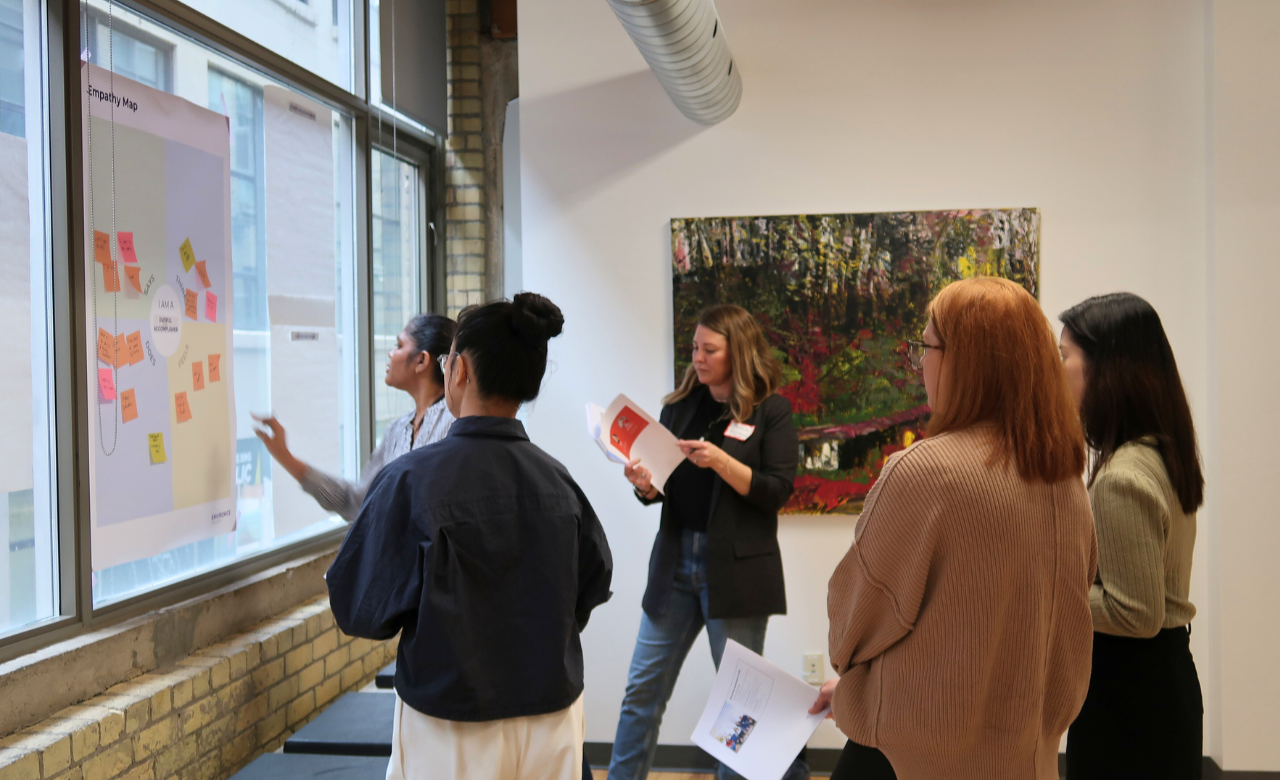Helping veterans connect with civilian employment opportunities
Commissionaires & Environics Research
CASE STUDY BY Sarah Roberton & Maysa Husseini
Environics Research worked with the Canadian Corps of Commissionaires, a not-for-profit organization, to understand the motivations and mindsets of veterans and help Commissionaires continue to provide meaningful civilian employment roles where veterans can thrive and contribute.
Background
Across Canada, more than 150,000 veterans who have concluded their service with the Canadian Armed Forces (CAF) or Royal Canadian Mounted Police (RCMP) are in their prime working years.[1] This is a substantial talent pool of accomplished Canadians whose career experience has included work in intense environments and meeting exacting demands. Moreover, today’s veterans are on average more highly educated than those in previous generations – and they tend to leave service earlier in life, leaving them more time to advance through civilian career paths. At the same time, the transition to civilian employment can be a challenging one; it’s important for veterans and employers alike to find the right fit.
Goal
Commissionaires, a not-for-profit founded to help veterans transition into civilian employment (and itself the largest private sector employer of veterans), approached Environics Research for help to gain a deeper understanding of the characteristics and values of today’s veterans and their families. Together, Commissionaires and Environics developed the goal of creating evidence-based personas that would help the organization’s team develop meaningful employment opportunities to attract veterans and allow them to contribute to their full potential.
Considering that some Commissionaires tasked with supporting veterans’ career journeys do not always have military experience themselves, we determined that personas would be an effective way to help employees gain insight into the diversity within the veteran community. Even more, the ways in which veterans in general tend to differ from people in other lines of work.
Our Approach
The process we used to develop distinct veteran personas, grounded in solid evidence, began with a series of stakeholder interviews to understand exactly what Commissionaires leaders understood already and what they wanted to learn about veterans’ mindsets. Next, we embarked on a qualitative research phase, having in-depth conversations with veterans themselves. We sought their perspectives on the transition to civilian employment, including what they aspired to, how they understood the change they were navigating, and what kinds of conditions they saw as most conducive to their career success. We used insights from the qualitative research to develop a quantitative tool, gathering insight from 250 current and former CAF and RCMP members through an online survey. Specifically, we explored how prevalent the attitudes and priorities identified in the qualitative interviews were among the broader population of veterans.
EARLY PROJECT GROUNDING

IN-DEPTH INTERVIEWS

ONLINE SURVEY

VETERAN PERSONA

PRESENTATION
EMPLOYEE WORKSHOPS
Insights
Our findings confirmed that veterans are by no means a monolithic population. Like other Canadians, they vary in their experiences, values, and preferences – characteristics that shape their career aspirations as well as other aspects of their lives. To support veterans effectively, Commissionaires needed to understand prevalent mindsets within the population they served. By weaving together the findings from the qualitative interviews and quantitative survey and applying some cluster analysis to the data, we were able to reveal three distinct personas of veterans:
Group 1
These veterans find fulfillment in experiences that challenge them. They thrive in fast-paced environments that require them to solve problems and navigate change. In their ideal work environment, they are constantly learning by being surrounded by new technology and people of different backgrounds. As one recent veteran described their ideal job,
“No day is the same. It feels new, refreshing, and avoids stagnation which helps to keep the job fresh and allows me to develop and grow.”
Group 2
Favouring a more predictable work environment — combining stability, balance, and good pay — these veterans are interested in roles where they can shine through diligence and discipline. Less confident than the other personas, this group is more likely to fear their education level or niche skills might stall their entrance into the civilian workforce. One veteran who’d recently left the military isolated a key issue:
“[Leaving the military] was definitely a hard decision, because the military was always easy for me. There weren’t any surprises at all.”
Group 3
Concentrated in the 35-44 age group, and often supporting young families, this segment is more likely to put financial security and job stability ahead of other factors. These veterans are looking for opportunities where the skills developed through their military or police service would be recognized and respected, and where they could find a strong sense of purpose. As one service member considering retirement put it,
“The dream would be to find passion that is as strong as the military. In the military, you are surrounded by great minds. I would like to keep learning, using my brain, and do something good.”
“This research helps answer questions about the types of employment veterans are looking for, what’s important to them, and how we can continue to meet their evolving employment needs. In a competitive landscape for highly trained veterans, this insight enables Commissionaires to tailor job offerings for every skill level, age group and mindset. The dedicated women and men, and their families, have sacrificed so much and truly deserve meaningful and relevant second and third career opportunities.”
Captain (Ret’d) Harry Harsch, Chief of Staff, Commissionaires National Office, 36-year veteran of the Royal Canadian Navy
Application
Commissionaires’ leaders believed that the research findings could provide valuable insights to their various departments and teams, equipping them to recruit and serve veterans even more effectively. To help Commissionaires realize the full value of the research, the organization’s leaders empowered Environics to go beyond the standard process of sharing the findings in written reports.
We facilitated workshops with the organization’s staff, using interactive learning activities to begin socializing the personas – and supporting them in developing their own ideas about how the segments could be applied in their day-to-day work. Environics also presented to the Commissionaires National Board, aiming to embed a consistent understanding of the key veteran segments at every level of the organization.
Having helped many client organizations to develop and apply segmentations and personas, we’ve found that the more organizations can put the personas into daily use, the better teams become at tailoring their communications and offerings for maximum impact. As the Commissionaires team continues to use these tools – bringing them into their daily thinking and conversations – the better they will be able to understand and support veterans who bring different goals and concerns to their career transition process.
About Commissionaires
Commissionaires is Canada’s largest private sector employer of veterans and the only national not-for-profit security company. Founded on the core military values of dedication, responsibility and sense of mission, Commissionaires employs 22,000 people from coast to coast. It offers a wide range of security services including professional guarding, monitoring and surveillance, threat risk assessment, non-core policing, by-law enforcement, digital fingerprinting, background screening, investigations, and security training. Commissionaires is a completely self-funded organization that serves a diverse range of public and private sector organizations.
Learn more about Commissionaires here: Commissionaires.ca
[1] According to Statistics Canada, there are 461,240 Canadian veterans, about a third of whom are between the ages of 25 to 54.
Find out how our Public Affairs team can help your organization
Related insights



Toronto
366 Adelaide Street West
Suite 101, Toronto, ON
Canada M5V 1R9
416 920 9010
Ottawa
135 Laurier Ave W.
Ottawa, ON
Canada K1P 5J2
613 230 5089
Calgary
421 7th Ave SW
Suite 3000, Calgary, AB
Canada T2P 4K9
403 613 5735
